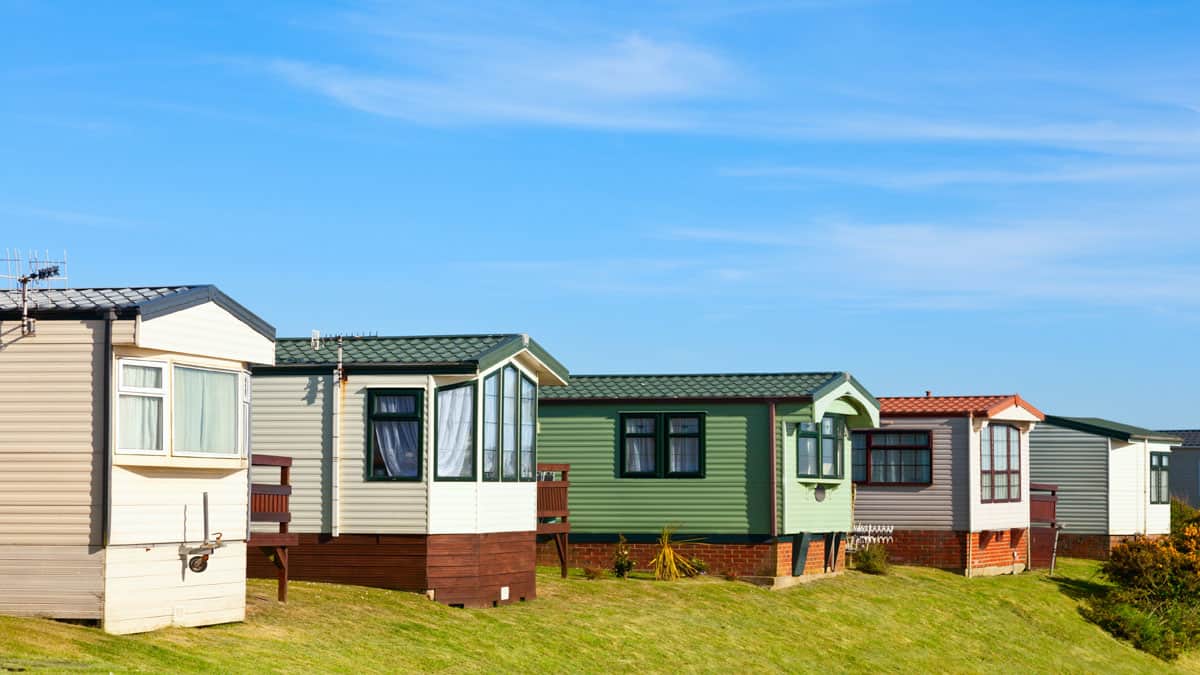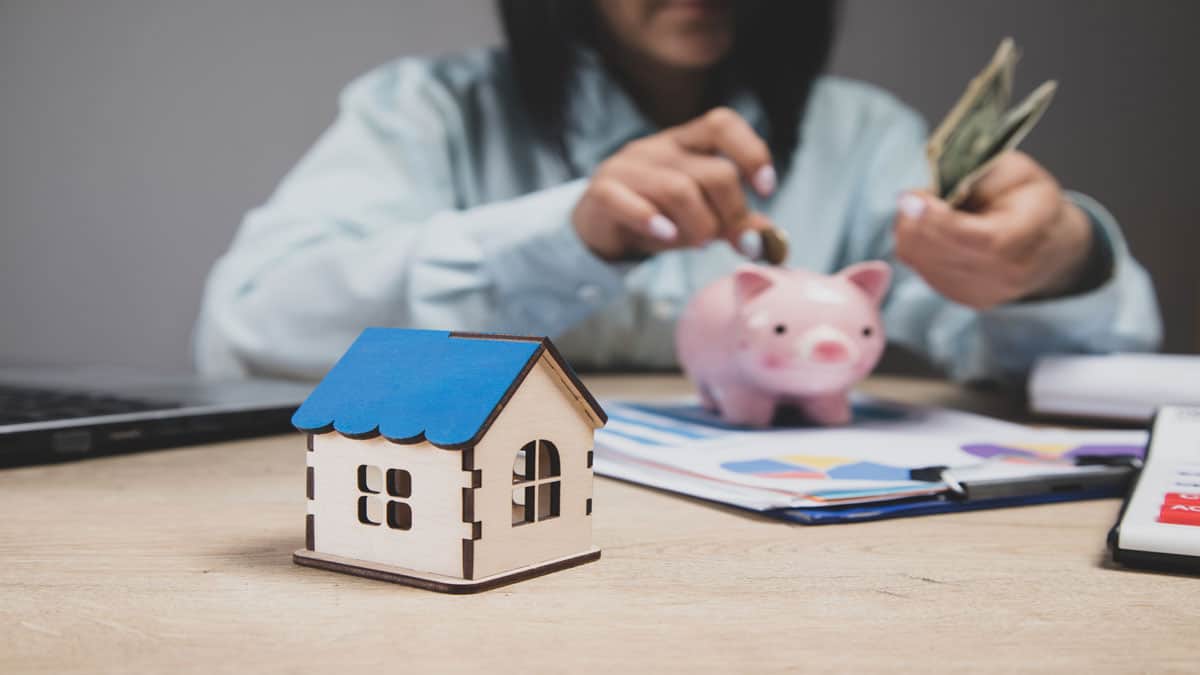THIS POST MAY CONTAIN AFFILIATE LINKS. PLEASE SEE MY DISCLOSURES. FOR MORE INFORMATION.
Ready to take the plunge and become a homeowner, but cringing at the thought of obtaining an expensive mortgage?
Fear not! There are lots of creative ways you can buy a house without taking out a traditional mortgage.
From getting creative with down payments to enlisting help from family members or outside investors, these methods can save you tens of thousands in costs while helping you secure your dream home.
Read on to explore all the different options available to those looking for how to purchase their perfect abode without going through a bank for a loan.
#1. Buy A House At An Auction

Purchasing a home at an auction can be an effective alternative to getting a property at a lower price without needing a mortgage loan.
Homes are typically sold at auctions when they’ve been foreclosed on, meaning the owner has defaulted on their mortgage or failed to pay property taxes over a prolonged period.
Once the lender has repossessed a property, it will go to an auction, and bidders will have the chance to make their offers. Buying a home at an auction also has some other caveats, such as not being able to view the home before placing a bid or purchasing a property in poor condition.
Nevertheless, purchasing a property at an auction can be an excellent method for forgoing a traditional mortgage.
#2. Rent To Own

Suppose you can’t qualify for a conventional mortgage or aren’t in a position to commit to one. A rent-to-own agreement could be a great way to buy.
This purchase agreement allows you to lease a property and eventually purchase it directly from the landlord. The advantages of renting to own include not being tied to a traditional mortgage and securing the property at its current market price.
This enables tenants to save enough money during the leasing period and purchase the property later.
Another scenario that some real estate investors agree to is having your monthly rent payments act as your mortgage payments. You agree to a purchase price, loan term, and interest rate in this scenario.
You then sign a promissory note with all this information on it. When you make your monthly payments, you are increasing your equity in the property. At the end of the loan term, the house is now yours.
If you decide to go this route, ensure you read the contract carefully. In some cases, these offers include balloon payment requirements, where after five years, you must pay the remaining balance to own the home.
Depending on the amount owed, you might need to look into traditional financing or a personal loan.
#3. Seek Out Private Money Lenders

Private money lenders offer hard money loans, which are usually investors, not banks. Here you get the cash for a short-term loan, say under six months.
The advantage to this is you can buy a house now if you find one you like and are waiting on a lump sum of money in the coming months. You also don’t have to worry about a credit check and get a fast approval process.
The downside is they carry higher interest rates than traditional financing. The most typical clients for these loans are people with bad credit and real estate investors.
#4. Get Money From Friends And Family

Getting a mortgage requires going through a traditional mortgage lender, like a bank or credit union, and qualifying under their terms, which can limit or deter potential buyers.
Alternatively, it’s also possible to inquire about a private loan.
Many get private loans through family members or private individuals willing to supply the requested amount. Obtaining a private loan can be a safe solution for some buyers because it simplifies home-buying.
It also means forgoing high-interest rates from the banks and any other limitations that prevent potential buyers from qualifying for a conventional mortgage, such as bad credit.
Although you can get private loans from people close to you, including parents or grandparents, it’s vital to establish clear terms and conditions of the loan.
Both lenders and borrowers should ensure the loan’s repayment terms coincide with the Applicable Federal Rate (AFR) and that they understand how the loan may affect their taxes.
#5. Apply For A Government Loan

Government loans can help make buying a house more affordable. And there are a handful of options out there. For starters, the Federal Housing Administration, or FHA, offers FHA loans with down payment requirements of just 3.5%.
This is an easy way to buy a house without needing a lot of cash for the down payment, and it is great for first-time home buyers.
If you are a Veteran, Service member, Reservist, or part of the National Guard, you could qualify for VA loans with unique advantages for service members.
Finally, there is a rural housing loan program if you want to buy a house in a rural area.
#6. Pay With Cash

Paying for a home with cash is one of the easiest ways to circumvent traditional mortgages. Although straightforward, paying for a home in cash means you’ll need to be prepared to have the exact amount upfront.
In the long run, it can save you from debt repayments, closing costs, and needed a high credit score.
Another benefit is it helps to ensure you don’t buy a house you can’t afford, known as being house rich, cash poor. This method can also work for those expecting a big monetary gift, such as funds from a trust or an early inheritance.
According to Bryan Wisda, CFP® at Almega Wealth Management, the downside is “by paying cash for the home the obvious pro is not having a payment but the con is using money that you may be able to deploy to other investments and potentially earn a higher rate of return.”
#7. Use Crowdfunding

One way to avoid using your own money for a home purchase is to use crowdfunding. This option is a newer one, but many have successfully used this creative financing trick.
Jump on a crowdfunding site and see if people will be willing to give you money to help you buy a home.
The key here is, to be honest. You should not lie about why you need the money or anything like that. Doing so could get you into serious legal trouble. Instead, be honest and explain why you need the cash and what you will do with it.
You may be surprised by how many people will donate some money to buy your primary residence.
#8. Discuss Seller Financing

Seller financing refers to a formal arrangement where the property’s seller agrees to serve as a lender to a potential buyer.
Sellers may offer this option to potential buyers to avoid third-party lenders and retain property rights should the buyer default on the financing agreement.
A seller financing arrangement can sometimes be cheaper than a traditional mortgage because potential buyers have more leeway to negotiate the terms, including the repayment schedule, the deposit, or the interest rates.
#9. Look For A Property With Shared Equity

Properties with shared equity are becoming more popular because they allow buyers to obtain homes at affordable rates.
When a property has a shared ownership agreement, you split ownership between two parties, an investor and the buyer. These two parties agree to specific percentages of the property’s ownership, but the investor will usually hold a higher percentage.
This model allows buyers to reduce their initial deposit because the investor will contribute more to the overall down payment percentage.
The investor will also be entitled to profits from the future sale or the property’s appreciated value.
Purchasing a property with shared equity can be an excellent way for people to buy their first home. Buyers with a poor credit history or low-income buyers can also use it to purchase a home without as many financial risks.
#10. Buy A Duplex

A twist on the financing strategy above is to buy a duplex. When you do this, you can live in one half of the house and use the other half as a rental property.
The rental income you earn from the other unit will pay for a portion of your mortgage. And if you can get a great deal on the house, in some cases, it can cover the entire mortgage. This means you can live mortgage free.
You can save extra money for a down payment on another house during this time. And when you do decide to move, you can rent out the side of the duplex you were living in.
Now you have more rental income that will cover the entire mortgage on the duplex. And if you are lucky, you might have extra income you can use to pay some of the mortgage on your new house too.
Another twist on this is the BRRRR method. Here you buy a fixer upper at a low price, rehab it, rent it out, do a cash out refinance, then repeat the process.
But you can skip the renting out part for now and live in it as long as you want. And if interest rates are low, you could refinance to save money every month.
#11. Use Your Investment Money

If you have significant assets in a brokerage account, you could set up a securities-backed line of credit with your brokerage company.
Doing this would help you avoid dealing with a conventional lender, closing costs, and PMI. There could be a way to make money with this option.
According to Doug Amis, CFP® at Cardinal Retirement Planning, Inc., “it could even create an arbitrage scenario where your assets are earning more than the cost of the loan.” This means when your finish paying off your mortgage, you will have more money in your brokerage account than when you started.
There are some drawbacks here. First, these loans usually have a variable interest rate, so make sure you understand how high it can go.
Second, you cannot use retirement savings as collateral for the loan.
#12. Buy With Friends

One of the most creative financing strategies is to buy a house with friends. Here, you get a friend split the costs. If the down payment requirement is $50,000, you each put down $25,000.
Then you split the monthly mortgage payment and other house-related bills in half.
The biggest issue with this idea is if your friendship ends and one person stops paying, the other person is on the hook for the entire mortgage.
#13. Get Paid To Move

Many smaller towns throughout the country offer people money to move. These small towns have seen many people move out and are looking to reestablish themselves.
The amounts vary by city, but they pay you $10,000 or more. Some even throw in extras like free admission to cultural events or free Airbnb stays so you can explore the town before moving there.
You do want to pay attention to any conditions attached to these offers. Some give you the money to move there.
Others require you to earn a certain amount of income, or you need to be employed by a local business instead of remote work.
#14. Buy A Mobile Home

Another common way to purchase a home without a mortgage is to reconsider the type of home you want. Rethinking the type of home allows you to opt for something a bit cheaper or that you can buy with cash.
For example, a mobile home offers a cheaper alternative than a single-family home or townhouse.
The downside is that owning a mobile home is slightly different from owning a traditional house. With a mobile home, you buy the trailer and then pay a rights fee for a lot of land the trailer is on.
This rights fee is a monthly rental fee. So while you aren’t an actual homeowner in the traditional sense, you still own the home, just not the land it sits on.
#15. Consider A Tiny Home

Tiny homes are popular alternatives because they’re much cheaper than purchasing a single-family home that requires a mortgage to supplement its high market price.
These homes offer the same benefits as any other type of house, including adequate living space, yard space, ideal locations, and much more. All these features are in a house that is 600 square feet or smaller.
So if you could comfortably live in a small house, this is the best option since the purchase price is as little as $20,000.
#16. Buy A Prefab Home

Manufactured homes, or prefab homes, are another alternative to help you save money. Since these houses come primarily pre-assembled, the labor costs are minimal, saving you thousands of dollars.
Another benefit is they tend to be on the leading edge of energy efficiency, meaning you can save thousands when it comes to your utility costs.
The downside is that if you are building a prefab home, you need to find the land to build on, which costs money. Still, going this route can lower your housing costs and make homeownership a reality.
#17. Find A Permanent House Swap

A permanent house swap refers to switching or ‘swapping’ properties with someone else with a similar or comparable property. This can be someone in the same area as you or on the other side of the country.
Although this may be a less conventional method of obtaining a home, it allows you to forgo the selling process if you have a property you want to get rid of.
It also stops you from picking up another mortgage, especially if you’ve just spent years paying off the previous one.
To make this easier, there are websites for people who list properties around the world open to house swaps so that you can connect easily with other potential buyers.
Finding a permanent home exchange can be challenging since the practice is still gaining traction.
Still, if you’re lucky enough, getting into a new home can be a rewarding way without going through traditional lenders for a mortgage.
Pros and Cons of a 30 Year Mortgage

When it comes to buying a house, most people opt for a 30 year mortgage. But just because everyone else gets one, that doesn’t mean it is right for you.
Learn the pros and cons of a 30 year mortgage to know if it makes sense for you.
10 PROS AND CONS OF A 30 YEAR MORTGAGE
How To Pay Your Mortgage Off Early

If you have a mortgage, you know the monthly payment can be annoying. You pay and pay and yet it feels like your balance never goes down.
That all ends now. Here are the best ways to pay off your mortgage early, in some cases, in half the time.
BEST TRICKS TO PAYING OFF YOUR MORTGAGE EARLY
Under The Table Jobs That Pay Cash

If you need cash right away, a typical job won’t work for you. You will have to wait a week to get paid, or in some cases, two weeks.
Luckily there are other options out there. Here are the best places to make cash under the table and walk out with cash in hand at the end of the day.
BEST UNDER THE TABLE JOBS THAT PAY CASH
How To Save For A House While Renting

A major challenge many renters face is figuring out to save for a house down payment while they are paying rent every month.
Luckily there are some simple ways to make this possible.
HOW TO SAVE FOR A HOUSE WHILE RENTING
How To Move Out With No Money Or A Job

Are you looking to change your situation and move but you don’t have any money?
Or worse, do you also not have a job? You might think your goal is hopeless, but it’s not. Here are the steps you need to take.
HOW TO MOVE OUT WITH NO MONEY AND NO JOB
I have over 15 years experience in the financial services industry and 20 years investing in the stock market. I have both my undergrad and graduate degrees in Finance, and am FINRA Series 65 licensed and have a Certificate in Financial Planning.
Visit my About Me page to learn more about me and why I am your trusted personal finance expert.

